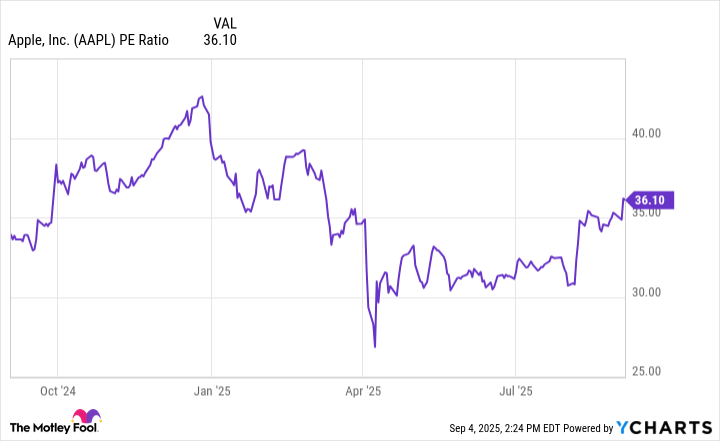The future for Apple (AAPL 0.93%) just got a lot less murky thanks to the United States court system. In the monopoly case against Google Search, a judge ruled last year that the business was indeed violating anticompetitive laws in the United States. Since then, there has been deliberation on what the remedies would be to keep fair business practices.
Even though the case was not against Apple, the lawsuit posed a major threat to its cash cow licensing deal for Google Search, which the case mentioned as monopolistic behavior that could be deemed illegal. In what some saw as a surprise ruling, the judge decided on Sept. 2 that it was permissible for Apple to receive these payments from Google Search as long as they are not exclusive deals.
At more than $20 billion in licensing fees a year, this is a huge profit driver for Apple, which is why the stock shot up 4% on the announcement. Here's what the ruling means for Apple and the stock going forward into the age of artificial intelligence (AI).

Image source: Getty Images.
Software licensing deals
Apple's customer base is a highly lucrative demographic. It has more than 2 billion active computing devices -- ranging from the iPhone to Air Pods -- that skew usage toward the top earners in countries, especially in the West. This is a huge revenue opportunity for mobile application and software developers.
In order to retain its dominance in the search engine market, Google and its now parent company Alphabet (GOOG 0.85%) began paying Apple a licensing fee to make Google Search the default search provider on the Apple Safari browser. Including its cut of search revenue that happens on Safari, Apple's payment from Google has grown along with the business and is now reported at $20 billion a year or higher.

NASDAQ: AAPL
Key Data Points
Apple's consolidated operating earnings are $130 billion. Even though the company still makes the majority of its profit from selling iPhones, this single fee from Google makes up more than 15% of its annual operating earnings. Along with potentially other licensing deals, it has now been solidified as legal for Apple to receive these payments.
Is Apple falling behind in AI?
Keeping the Google payment likely led to a sigh of relief from Apple shareholders. A ruling in the other direction would have wiped out hundreds of billions in value from Apple's market capitalization and led to a fall in the stock price.
What shareholders should be concerned about today is Apple falling behind in AI. Its branded "Apple Intelligence" products have fallen flat with consumers, and its advanced new hardware tools powered with AI, such as the Vision Pro, have been flops. To make matters worse, Apple has reportedly lost a ton of AI developer talent to the likes of OpenAI, XAI, and Alphabet, which could further leave it behind the curve.
That has led Apple to come back to its old strategy of technology licensing. It is with the same company that makes Google Search: Alphabet. Alphabet's Gemini chatbot is not as popular as ChatGPT today, but Alphabet has the leading infrastructure to scale usage across billions of users given its cloud and semiconductor investments. Along with the court case ruling, news outlets are reporting that a new AI search tool with Siri could be powered by Gemini, although a deal has not been finalized.
The question is: Will Apple receive a payment from Alphabet for this partnership? It is unclear exactly how a deal would work out today given the differences between AI and the traditional search engine market. Building and deploying AI is expensive. If Apple is going to power Siri with Gemini, it may need to foot some of this bill.
AAPL PE Ratio data by YCharts.
What it all means for Apple stock
It is clearly a positive that Apple can still receive $20 billion or more a year from Alphabet. In the long run, a stock will appreciate in price along with its underlying profitability, and if Apple can milk $100 billion in total licensing revenue from Alphabet over the next five years, all the better for the business.
But what should give investors pause is the changing dynamics of the search engine and AI chatbot market. Five years from now, search may be totally upended by ChatGPT or even Alphabet's homegrown Gemini chatbot, which would eliminate the Google Search licensing deal that was just given the go-ahead by the United States court system. With a market cap of $3.5 trillion, $100 billion in earnings over five years is not particularly relevant for anyone considering buying Apple stock today.
What Apple needs to figure out -- and what investors need to think about -- is how to be the go-to personal computing hardware for the AI era. Whether through new computing form factors or licensing deals with the AI software makers, Apple's earnings should grow over the long term if it can be the No.1 way people access both the internet and AI.
Uncertainty abounds over whether Apple can make this happen. With an expensive-looking price-to-earnings (P/E) ratio of 36, the stock is not reflecting this uncertainty. It is probably best for investors to avoid buying Apple stock for the time being.








